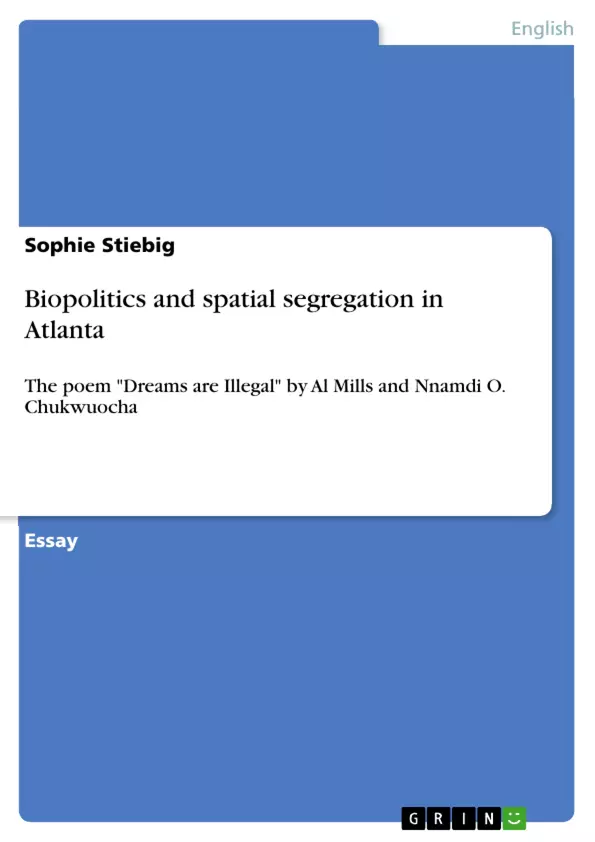Al Mills’ and Nnamdi O. Chukwuocha’s (The Twin Poets) poem “Dreams are Illegal” (2015) raises the still occurring problem of residential segregation especially by racial or ethnic groups in the United States. This problem can be exemplified by focusing on Georgia’s capital city Atlanta, a city whose history has been coined by the civil rights movement, also since it is Martin Luther King Jr.’s birth city.
Although the Fair Housing Act came into force in 1968, which prohibits discrimination because of race, color, religion, sex, disability, familial status, or national origin, there is still inequality and residential segregation that can be discovered in the demographics of the city’s neighborhoods. It is deeply connected to Foucault’s concepts of biopolitics, biopower and race, Agamben’s idea of Homo Sacer and Kristeva’s theory of the abject. The following essay will therefore focus on the interrelation of these concepts, the application on the occurring problems in the city of Atlanta and how they are presented in The Twin Poet’s poem.
Inhaltsverzeichnis (Table of Contents)
- Biopolitics and residential segregation in the US
- Atlanta: A City Divided
- The concept of abjection
- Biopolitics, biopower and racism
- Disparities between schools
- "Dreams Are Illegal" by The Twin Poets
- Hope for a Better Future?
Zielsetzung und Themenschwerpunkte (Objectives and Key Themes)
This essay examines the ongoing problem of residential segregation in the United States, particularly in Atlanta, Georgia, through the lens of contemporary literary theory. The essay uses the poem "Dreams are Illegal" by The Twin Poets as a case study to explore the complex interrelationship between biopolitics, biopower, and racism in shaping spatial segregation. The essay analyzes the concept of abjection in the context of racialized housing patterns and the deprivation of public transportation services in predominantly Black communities.
- Residential Segregation and Racial Inequality in the US
- Biopolitics and Biopower in Shaping Urban Spaces
- The Concept of Abjection and its Relation to Residential Segregation
- Spatial Segregation and Disparities in Access to Education and Public Services
- The Role of Literature in Exposing Social Injustices
Zusammenfassung der Kapitel (Chapter Summaries)
- Biopolitics and residential segregation in the US
- Atlanta: A City Divided
- "Dreams Are Illegal" by The Twin Poets
- Hope for a Better Future?
This section introduces the topic of residential segregation in the US and its connection to biopolitics. It sets the stage for the analysis of Atlanta as a case study and the role of the poem "Dreams are Illegal" by The Twin Poets in understanding this issue.
This section dives into the specific context of Atlanta, exploring its demographics, the spatial segregation of black and white populations, and the application of concepts like abjection and biopower to explain these patterns.
This section analyzes the poem "Dreams are Illegal" and its portrayal of the experiences of African Americans in a racially segregated Atlanta. It connects the poem's themes to the concepts discussed earlier, highlighting the limitations imposed on Black individuals and the denial of their dreams.
This section briefly explores the possibility of change, mentioning the election of Keisha Lance Bottoms as a symbol of progress for the Black community in Atlanta. However, the essay does not delve into a detailed analysis of this aspect, focusing primarily on the challenges and injustices of segregation.
Schlüsselwörter (Keywords)
The essay focuses on key terms like biopolitics, biopower, abjection, residential segregation, racial inequality, and spatial disparities. It examines the interplay of these concepts in shaping the experiences of African Americans in Atlanta and how these themes are reflected in the poem "Dreams are Illegal" by The Twin Poets.
Frequently Asked Questions
How does residential segregation manifest in Atlanta today?
Despite the Fair Housing Act of 1968, Atlanta remains deeply divided along racial lines, with significant disparities in housing quality, public transportation access, and school funding between predominantly Black and white neighborhoods.
What is the connection between biopolitics and urban segregation?
Applying Foucault's concepts, the essay argues that urban planning and housing policies act as biopolitical tools that regulate where certain populations live, effectively controlling their quality of life and opportunities.
What does the concept of "abjection" mean in the context of Atlanta?
Based on Kristeva's theory, abjection refers to the social and spatial exclusion of certain groups. In Atlanta, this is seen in the neglect of infrastructure and services in Black communities, treating them as "other" or "abject" spaces.
How does the poem "Dreams Are Illegal" reflect these issues?
The poem by The Twin Poets portrays the lived experience of African Americans in segregated spaces, highlighting how systemic barriers and racial inequality stifle the dreams and potential of Black youth.
What are the disparities in Atlanta's school system?
The essay explores how spatial segregation leads to unequal school funding and resources, as property-tax-based funding often favors wealthy, predominantly white areas over marginalized Black neighborhoods.
Who is "Homo Sacer" in the context of modern segregation?
Using Agamben's theory, the essay discusses how individuals in segregated, neglected areas can be reduced to "bare life," where their rights are technically present but effectively suspended by systemic poverty and exclusion.
- Citar trabajo
- Sophie Stiebig (Autor), 2020, Biopolitics and spatial segregation in Atlanta, Múnich, GRIN Verlag, https://www.grin.com/document/994823



